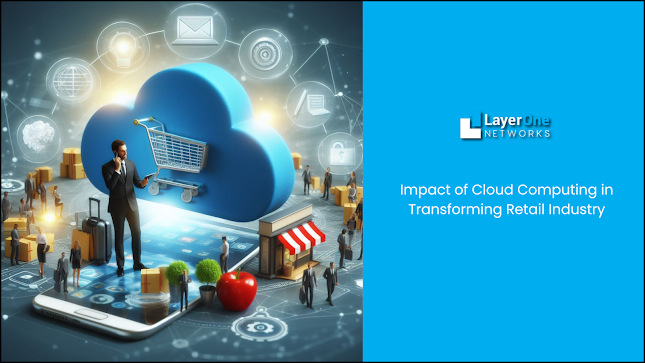Managing, storing, and analyzing data can be arduous in today's data-driven business landscape. However, businesses across various industries, including retail, are rapidly adopting cloud computing services to handle and process data, enabling real-time insights effectively. Cloud computing services have revolutionized retailers' operations, providing them an invaluable toolset to thrive in a highly competitive industry.
With the need to extend their reach to customers through multiple stores and efficiently manage complex supply chains, retailers are leveraging cloud computing services to streamline their processes, enhance data management, and unlock new avenues for growth and innovation. This discussion will delve into the transformative impact of cloud computing services on the retail sector, empowering retailers with increased efficiency, agility, and a customer-centric approach.
Related Posts: 6 Ways cloud computing helps businesses save time and money
What are the Benefits of Using Cloud Computing in the Retail Industry?
Cost Savings
Retailers may save a lot of money using cloud computing. Retailers can save Money by utilizing cloud infrastructure and services rather than making an initial investment in pricey hardware and software systems. Instead, customers may choose a pay-as-you-go system where they would only be responsible for the resources and services they use. This eliminates the need to maintain and upgrade costly on-premises IT infrastructure, reducing operational expenses and increasing cost efficiency.
Streamlined Inventory Management
Cloud computing enables retailers to manage their inventory efficiently. Retailers may track stock levels, track product movement, and automate replenishment procedures with cloud-based inventory management solutions. Real-time visibility into inventory helps reduce stockouts and overstock situations, ensuring optimal inventory levels. By streamlining inventory management, retailers can improve operational efficiency, minimize carrying costs, and enhance customer satisfaction by ensuring product availability.
Facilitates Innovation and Product Development
Cloud computing is a key factor in the IT services companies' ability to stimulate innovation and product creation in the retail sector. Retailers can utilize cloud-based platforms that enable quick prototype, testing, and launch of new products or services by using the knowledge and resources of IT services businesses.
Retailers may rapidly experiment with different concepts, iterate on product designs, and get real-time customer feedback thanks to the scalability and flexibility provided by these cloud services. Additionally, IT services providers support cross-functional team cooperation by enabling the easy exchange of knowledge, resources, and expertise, promoting an innovative retail culture.
Enhanced Data Security
Data security is paramount in the retail industry, where customer information and sensitive business data are at stake. Cloud computing provides cutting-edge security safeguards to protect sensitive retail data. To protect against cyber risks, cloud service providers adopt strict security measures such as data encryption, access limits, and routine security updates. Additionally, retailers can gain from automatic backup and disaster recovery solutions offered by cloud platforms, maintaining company continuity and lowering the risk of data loss.
Improved Supply Chain Visibility
Cloud computing provides retailers with improved visibility into their supply chains. By leveraging cloud-based supply chain management systems, retailers can track and monitor inventory, shipments, and logistics in real time. This visibility enables proactive decision-making, optimizing inventory levels and reducing inefficiencies in the supply chain. With better supply chain visibility, retailers can enhance supplier collaboration, minimize order fulfillment time, and improve operational efficiency.
Foster Collaborative Ecosystems
By leveraging cloud-based platforms, retailers, suppliers, and other stakeholders in the retail industry can easily communicate and share data. IT consulting firms can help retailers collaborate with suppliers to optimize their supply chain and improve overall processes by sharing sales and inventory data.
Additionally, IT consulting firms can enable retailers to collaborate with external partners like marketing agencies or product designers, enhancing innovation and driving better business outcomes through cloud-based collaboration tools. Ultimately, IT consulting firms can leverage cloud computing to enable collaborative ecosystems that improve operations' overall efficiency and effectiveness within the retail industry.
Business Continuity and Disaster Recovery
For retailers, cloud computing ensures company continuity and effective disaster recovery. By storing data and applications in the cloud, retailers can mitigate risks associated with physical infrastructure failures, natural disasters, or other disruptive events. Cloud platforms offer automated backup and recovery solutions, enabling swift data restoration and minimal downtime. This capability is crucial in the retail industry, where uninterrupted operations and data integrity are vital for meeting customer demands and maintaining brand reputation.
Personalized Customer Experience
Retailers are now able to provide highly personalized customer experiences due to cloud computing, notably through the use of managed cloud services. By utilizing cloud-based customer relationship management (CRM) systems, retailers may effectively collect and analyze consumer data to acquire crucial information about preferences, previous purchases, and behavior. With the help of these insights, marketing campaigns, discounts, and product recommendations may be tailored to each customer's tastes. Retailers can improve consumer happiness, encourage long-term loyalty, and develop enduring relationships with their clientele.
Tailored Shopping Experience
Cloud computing has enabled retailers to offer customers customized shopping experiences. With cloud-based e-commerce platforms, retailers can offer customized product recommendations, unique pricing, and seamless omnichannel experiences. Cloud services' scalability and flexibility in handling high levels of user traffic simplify online shopping experiences. Retailers can also use cloud-based analytics tools to create customized marketing campaigns, improve product assortments, and learn more about customer preferences.
Greater Flexibility and Scalability
Cloud computing offers retailers greater flexibility and scalability to adapt to changing business needs. Retailers can easily scale their infrastructure up or down based on demand, ensuring optimal resource utilization. Cloud platforms provide on-demand access to computing power, storage, and other resources, enabling retailers to respond quickly to market fluctuations, seasonal demands, or unexpected spikes in customer activity. This flexibility and scalability help retailers optimize operational efficiency, reduce costs, and stay agile in a dynamic retail environment.
Related Posts: Nine Powerful Advantages of Cloud Computing
The Bottom Line
Cloud computing has revolutionized the retail industry by improving operational efficiency, enhancing supply chain visibility, and fostering collaborative ecosystems. Cloud-based solutions also enable retailers to deliver personalized shopping experiences, improving customer satisfaction and increasing retention rates.
By leveraging the expertise of cloud computing service providers, retailers can unlock the full potential of these tools to drive innovation, streamline operations, and enhance business outcomes. As such, the retail industry has become one of the most prominent users of cloud computing services, further validating the importance of effective cloud management and optimization for retailers looking to stay ahead in a highly competitive marketplace.


Comments
Post a Comment